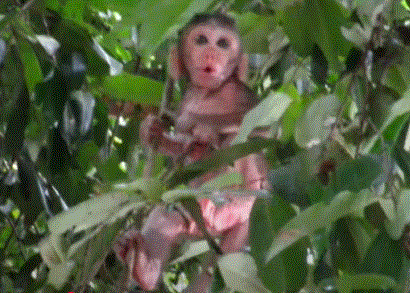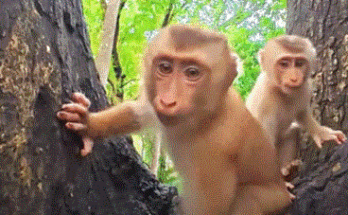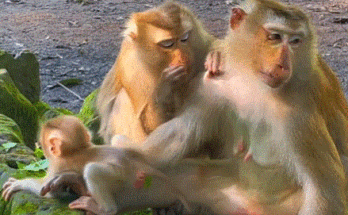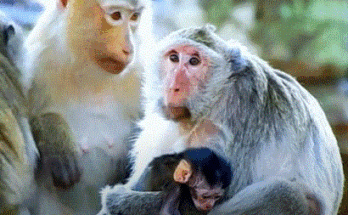The forest around Angkor Wat holds secrets as old as time. Every root curling around the ancient stones, every rustling leaf in the morning breeze tells a story. But on one particular morning, it was not the carved faces of the temple towers or the chants of monks that held my attention—it was the fragile life of a tiny baby monkey, clinging to survival in the ruins of Cambodia’s most sacred place.

They called him Kiri—a name whispered by the guides who had grown fond of watching him. Still so young, Kiri’s fur was a soft brown fluff, his eyes wide with curiosity and innocence. He was always restless, always testing the boundaries of what his tiny body could manage. But Angkor’s forests are not a playground; they are a place where danger lurks in every shadow.
That morning, the air was heavy with the smell of wet earth after a night of rain. The sunlight broke through the canopy in scattered rays, spotlighting the mossy stones where Kiri and his mother searched for food. She carried him close, as she always did, but Kiri squirmed, eager to explore on his own. And in a moment of childish determination, he slipped free from her grasp.
Kiri toddled toward the edge of a stone ledge overlooking the temple moat. His tiny hands stretched for a cluster of leaves swaying just beyond reach. My breath caught in my chest. The drop below wasn’t far for a grown monkey, but for Kiri, it could mean disaster.
The forest seemed to fall silent. Even the cicadas stopped their song as if holding their breath with me.
Kiri’s mother let out a sharp cry—one that pierced the quiet like a blade. She lunged forward, her body moving faster than I thought possible. In those few seconds, the ancient world around us vanished. All that remained was the fragile life of a baby on the edge of danger, and the desperate love of a mother determined to save him.
Just as Kiri’s tiny foot slipped, she caught him, scooping him back into her arms before gravity could take him. The sound that escaped my lips wasn’t words—it was relief, raw and overwhelming.
Kiri clung to her chest, trembling. His tiny fingers dug deep into her fur, refusing to let go. She rocked gently, murmuring low grunts of reassurance, her cheek pressed against his tiny head. In that moment, she was not just a monkey. She was every mother I had ever known. She was the embodiment of instinct, love, and sacrifice.
Watching them, I felt tears sting my eyes. The bond between parent and child transcends species, transcends language. What I saw in the Angkor forest was not just animal behavior—it was love in its purest, rawest form.
For the rest of the morning, Kiri stayed pressed tightly against his mother, his little body rising and falling with her breath. He had learned something that day: the world can be dangerous, but in his mother’s arms, there is safety.
As I stood among the ruins, I thought of parents everywhere—those who have run across busy streets to snatch a child from danger, those who have sat awake at night whispering reassurances after a nightmare, those who live each day with a heart that beats outside their own body. Whether human or primate, that bond is the same. It is fierce, protective, and unbreakable.
Angkor Wat may be a temple built of stone, but that morning, its true holiness was alive in the forest. Not in the carvings or the chants, but in the simple act of a mother saving her child.


